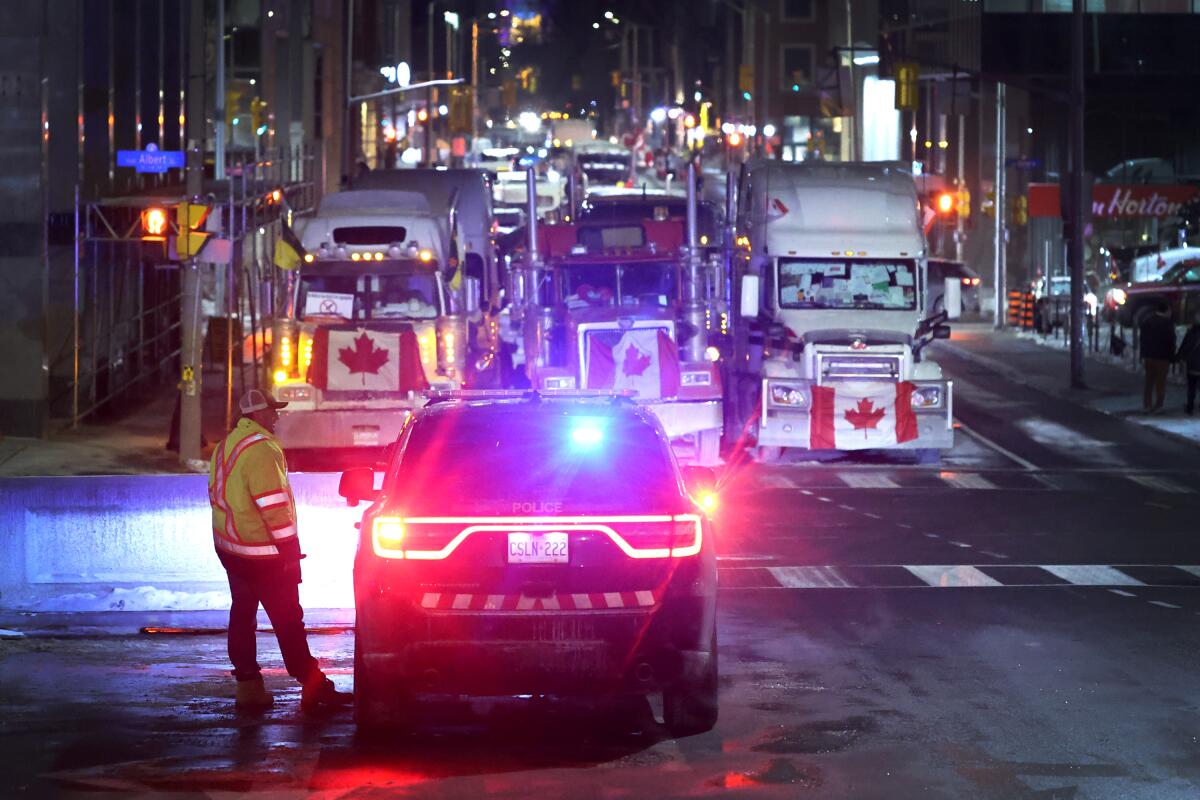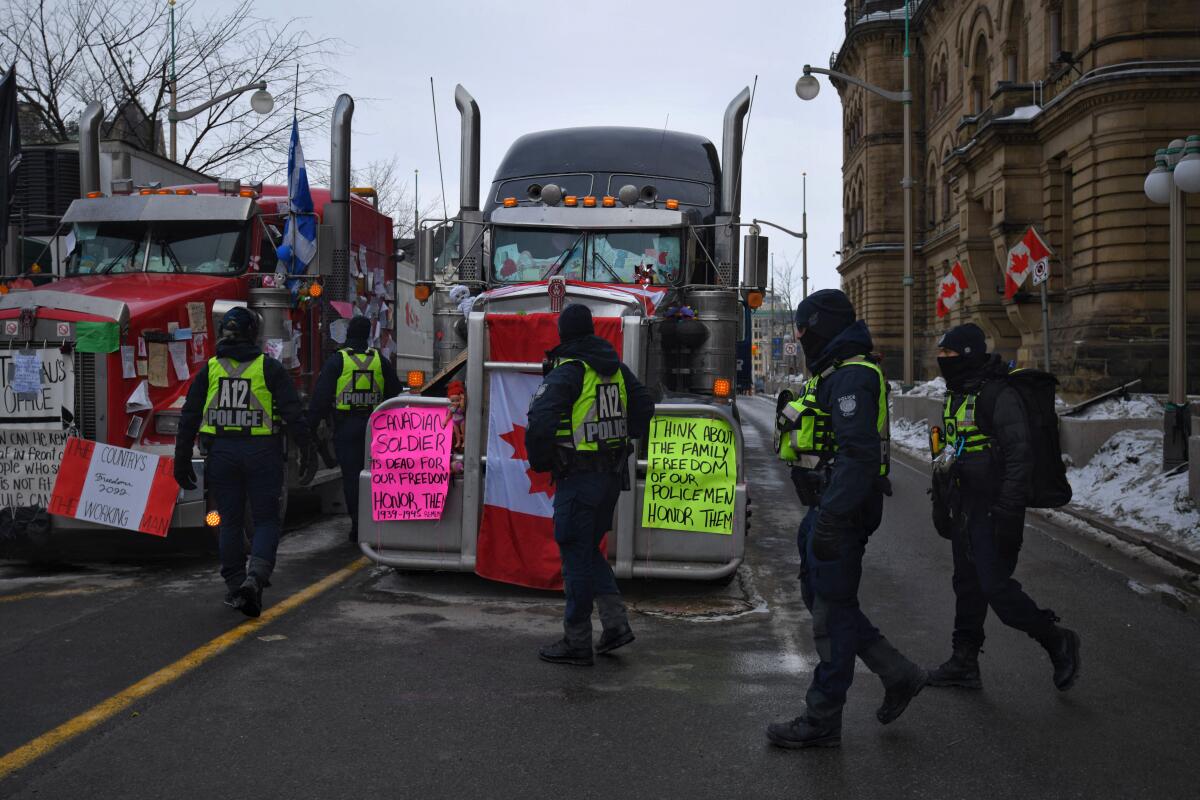Canada’s image of itself jolted by unruly protests

- Share via
OTTAWA — Andre Landry said he wasn’t worried about a threatened police crackdown on truckers whose rigs have blocked the streets of the Canadian capital, turning the stately government district into a boisterous protest strip and block party.
Landry sat in the cab of his big rig, which was draped with a Canadian flag and parked in front of the majestic Gothic Revival Parliament complex in Ottawa.
“We have done nothing wrong,” Landry, 49, said Wednesday. “The police are our friends. And we all believe in freedom.”
Truckers and other protesters who have essentially shut down part of Ottawa for almost three weeks in protest of COVID-19 mandates and restrictions responded with defiance as authorities seemed poised to evict hundreds of illegally parked vehicles. Truckers honked their horns repeatedly in an emphatic rejection of police warnings.
“You must leave this area now,” Ottawa police demanded in leaflets handed out on Wellington Street, the main drag fronting Parliament. “Anyone blocking streets, or assisting others in the blocking [of] streets, are committing a criminal [offense] and you may be arrested. You must immediately cease further unlawful activity or you will face charges.”
Demonstrators made a point of crumpling the notices and tossing them into trash bins, sometimes as news cameras rolled.
“We’re not going anywhere,” said Tyler Armstrong, 26, whose rig was parked close to Landry’s on Wellington Street. “Not concerned at all.”
The protest began as a rejection of a Canadian government requirement that cross-border truckers be vaccinated. But the demonstrations in the capital and at Canadian-U.S. border crossings have spurred a global copycat movement against all pandemic restrictions and morphed into a protest against the Liberal government of Prime Minister Justin Trudeau.
The daily spectacle along Wellington Street also appears to have battered the collective psyche of Canada, a country generally not known for bruising ideological brawls and flag-waving displays of political partisanship.
The time-honored tradition of Canadians making nice appears to have gone out the window as protesters vent their ire, often in vulgar language, at Trudeau, who is regularly denounced as a dictator in all but name. Posters depict Trudeau as the illegitimate son of former Cuban leader Fidel Castro, among other characterizations.
Residents and others seem genuinely astonished that a descent to this level of discourse — accompanied by a rowdy blockade labeled a “carnival of chaos” by one lawmaker — could have happened in Canada. They wonder when and how the daily disruptions on the streets will end.
“Does anyone know what the hell is going on anymore?” columnist Kelly Egan wrote Tuesday in the Ottawa Sun. “Monday certainly had the feel of the city, the province, maybe the country, going madly off in all directions.”
Trudeau on Monday invoked the federal Emergencies Act — a law never previously used — in a bid to give authorities additional legal tools to evict the truckers and other blockaders. The city and province of Ontario had already declared emergencies, and courts had upped fines for illegal parking and horn-honking, a signature trucker protest tactic. But all had little effect in tamping down the cinematic spectacle along a half-mile stretch of Wellington Street.
The effect of what authorities call the “occupation” has been viewed by some as something akin to what many in the United States felt when rioters stormed the U.S. Capitol on Jan. 6, 2021 — though not deadly or anywhere near as violent. Some outraged Canadians see a kind of cross-border metastasis of U.S.-style crass politics — a notion amplified when conservatives like Donald Trump, Texas Sen. Ted Cruz and Tucker Carlson, the Fox news host, heap praise on the protesters.
As part of the Emergencies Act, Canada has banned foreigners from traveling to the country to participate in convoy protests. Authorities are also mandating that crowdfunding sites register with a federal financial oversight agency if the platforms are linked to the convoy, a move meant to stem financial aid from both Canada and the United States.
Many protest participants reject the notion that the demonstration in Canada is anything other than a homegrown phenomenon, not some kind of knock-off of U.S. right-wing politics.
“This is about Canada, about Canadians,” said Sharon Clark, 70, a retiree from outside Ottawa who said she protested as a youth in 1960s-era UC Berkeley and came to Wellington Street on Wednesday to support the demonstrators. “Canadians have a long fuse. But at the end of that fuse is a cannonball.”
Many protesters traveled to Ottawa from rural and western areas of the country where Trudeau’s Liberal Party is not popular.
Trudeau has denounced the protesters as a “fringe minority,” and refused to meet with them.
Apart from the disruption on the streets, the protests have had a heavy financial toll for businesses in the downtown area, where many shops are closed and the streets are largely deserted, except for protesters and police.
Last weekend, residents from one protest-battered neighborhood — exposed to weeks of horn-honking, diesel emissions and what many call harassment — set up their own blockade and counter-protest to block vehicles seeking to join the convoy.
“These people have suffered like hell,” Ottawa Mayor Jim Watson told Canada’s CTV.
Ottawa police have been harshly criticized for allowing the truckers to park outside Parliament weeks ago and remain there. Police have watched as protesters regularly bring jerry-cans filled with diesel back to the blockading vehicles, allowing demonstrators to stay overnight in heated vehicles despite subfreezing temperatures.
The Ottawa police chief, Peter Sloly, resigned Tuesday in what was widely seen as a result of his botched response to the protests — even as authorities were able to break up similar, albeit smaller, blockades along the Canadian-U.S. border without violence or mass arrests. Additional provincial and Royal Canadian Mounted Police have been deployed to aid the Ottawa police, and officials have set up a joint command center.
How law enforcement will proceed to end the blockade remains unknown. Authorities estimate that there are about 150 protesters present each night, and about 360 vehicles parked in the downtown core.
Officials are hopeful that many protesters will leave voluntarily, but they have made clear that police will act before this weekend — when hundreds of revelers are expected to join the blockade, amid barbecues, DJ-curated musical presentations and other live attractions. Wellington Street has seen raucous partying each weekend since the demonstrations kicked off.
But Parliament Hill may soon be declared a “no go” zone, Marco Mendicino, Canada’s public safety minister, told reporters Tuesday, and those refusing to leave could face fines and jail time.
“No one wants to see another weekend like the last three on Wellington Street,” Mendicino said. “I’m assured by my discussions with police that they fully appreciate that. We now depend on them to do the job.”
Special correspondent Denis Calnan in Toronto contributed to this report.

More to Read
Sign up for Essential California
The most important California stories and recommendations in your inbox every morning.
You may occasionally receive promotional content from the Los Angeles Times.













